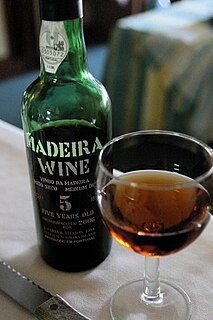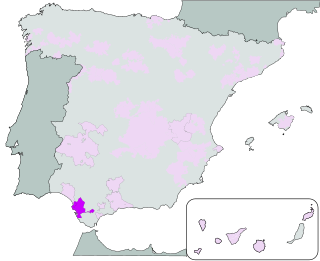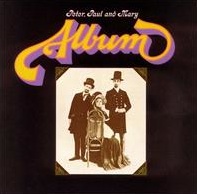
Fortified wine is a wine to which a distilled spirit, usually brandy, has been added. In the course of some centuries, winemakers have developed many different styles of fortified wine, including port, sherry, madeira, Marsala, Commandaria wine, and the aromatised wine vermouth.

Vermouth is an aromatized, fortified wine, flavored with various botanicals and sometimes colored.

Madeira is a fortified wine made on the Portuguese Madeira Islands, off the coast of Africa. Madeira is produced in a variety of styles ranging from dry wines which can be consumed on their own as an aperitif to sweet wines usually consumed with dessert. Cheaper cooking versions are often flavoured with salt and pepper for use in cooking, but these are not fit for consumption as a beverage.

Dessert wines, sometimes called pudding wines, are sweet wines typically served with dessert.

Sherry is a fortified wine made from white grapes that are grown near the city of Jerez de la Frontera in Andalusia, Spain. Sherry is produced in a variety of styles made primarily from the Palomino grape, ranging from light versions similar to white table wines, such as Manzanilla and fino, to darker and heavier versions that have been allowed to oxidise as they age in barrel, such as Amontillado and oloroso. Sweet dessert wines are also made from Pedro Ximénez or Moscatel grapes, and are sometimes blended with Palomino-based sherries.

Sauvignon blanc is a green-skinned grape variety that originates from the Bordeaux region of France. The grape most likely gets its name from the French words sauvage ("wild") and blanc ("white") due to its early origins as an indigenous grape in South West France. It is possibly a descendant of Savagnin. Sauvignon blanc is planted in many of the world's wine regions, producing a crisp, dry, and refreshing white varietal wine. The grape is also a component of the famous dessert wines from Sauternes and Barsac. Sauvignon blanc is widely cultivated in France, Chile, Romania, Canada, Australia, New Zealand, South Africa, Bulgaria, the states of Washington and California in the US. Some New World Sauvignon blancs, particularly from California, may also be called "Fumé Blanc", a marketing term coined by Robert Mondavi in reference to Pouilly-Fumé.

Apéritifs and digestifs are drinks, typically alcoholic, that are normally served before (apéritif) or after (digestif) a meal.

German wine is primarily produced in the west of Germany, along the river Rhine and its tributaries, with the oldest plantations going back to the Roman era. Approximately 60 percent of German wine production is from the federal state of Rhineland-Palatinate, where 6 of the 13 regions (Anbaugebiete) for quality wine are situated. Germany has about 103,000 hectares of vineyard, which is around one tenth of the vineyard surface in Spain, France or Italy. The total wine production is usually around 10 million hectoliters annually, corresponding to 1.3 billion bottles, which places Germany as the eighth-largest wine-producing country in the world. White wine accounts for almost two thirds of the total production.

A rosé is a type of wine that incorporates some of the color from the grape skins, but not enough to qualify it as a red wine. It may be the oldest known type of wine, as it is the most straightforward to make with the skin contact method. The pink color can range from a pale "onion-skin" orange to a vivid near-purple, depending on the grape varieties used and winemaking techniques. Usually, the wine is labelled rosé in French, Portuguese, and English-speaking countries, rosado in Spanish, or rosato in Italian.

The German wine classification system puts a strong emphasis on standardization and factual completeness, and was first implemented by the German Wine Law of 1971. Nearly all of Germany's vineyards are delineated and registered as one of approximately 2,600 Einzellagen, and the produce from any vineyard can be used to make German wine at any quality level, as long as the must weight of the grapes reaches the designated minimum level. As the current German system does not classify vineyards by quality, the measure of wine ’quality’ is the ripeness of the grapes alone.

Wine and food matching is the process of pairing food dishes with wine to enhance the dining experience. In many cultures, wine has had a long history of being a staple at the dinner table and in some ways both the winemaking and culinary traditions of a region will have evolved together over the years. Rather than following a set of rules, local cuisines were paired simply with local wines. The modern "art" of food pairings is a relatively recent phenomenon, fostering an industry of books and media with guidelines for pairings of particular foods and wine. In the restaurant industry, sommeliers are often present to make food pairing recommendations for the guest. The main concept behind pairings is that certain elements in both food and wine interact with each other, and thus finding the right combination of these elements will make the entire dining experience more enjoyable. However, taste and enjoyment are very subjective and what may be a "textbook perfect" pairing for one taster could be less enjoyable to another.

The subjective sweetness of a wine is determined by the interaction of several factors, including the amount of sugar in the wine, but also the relative levels of alcohol, acids, and tannins. Sugars and alcohol enhance a wine's sweetness; acids (sourness) and bitter tannins counteract it. These principles are outlined in the 1987 work by Émile Peynaud, The Taste of Wine.

"Kisses Sweeter than Wine" is a popular love song, with lyrics written and music adapted in 1950 by Pete Seeger and Lee Hays of The Weavers. The tune was adapted from Lead Belly's "If It Wasn't for Dicky" (1937), which in turn was adapted from the traditional Irish folk tune "Drimindown / Drumion Dubh". The Weavers first released the song in 1951 as a Decca single, which reached #19 on the Billboard chart and #20 on the Cashbox chart in 1951. The song was also a hit for Jimmie Rodgers in 1957 and Frankie Vaughan in 1958.

Don't Think Twice is an album by American country music artist Waylon Jennings, released in 1970 on A&M Records. It consists of previously issued singles and a few unreleased recordings from his days at A&M during 1963-64. The title track, as well as "I Don't Believe You" are covers of Bob Dylan songs. Several of the other songs on the album are standards. "Just to Satisfy You", first recorded by Jennings in 1964, was re-recorded and issued on the 1969 RCA Victor Jennings album Just to Satisfy You.
Precious Friend is a record by Arlo Guthrie and Pete Seeger with Shenandoah and a Warner Bros. recording.

The Power of Pussy is the third studio album by Bongwater, released in 1990 by Shimmy Disc. The album contains major college radio hits such as the title track, as well as favorites such as "Nick Cave Dolls" and "Folk Song," with covers of Dudley Moore's "Bedazzled" and "Kisses Sweeter Than Wine" by The Weavers. In 1998, it was remastered by Alan Douches and Kramer for its inclusion in Box of Bongwater set.
Boyd Daniel Clack is a Canadian-born Welsh writer, actor, and musician. He was born in Vancouver, British Columbia, Canada to Welsh parents. At a young age, he emigrated with his family to Wales, where he grew up in Tonyrefail, where his family were originally from.

Sugars in wine are at the heart of what makes winemaking possible. During the process of fermentation, sugars from wine grapes are broken down and converted by yeast into alcohol (ethanol) and carbon dioxide. Grapes accumulate sugars as they grow on the grapevine through the translocation of sucrose molecules that are produced by photosynthesis from the leaves. During ripening the sucrose molecules are hydrolyzed (separated) by the enzyme invertase into glucose and fructose. By the time of harvest, between 15 and 25% of the grape will be composed of simple sugars. Both glucose and fructose are six-carbon sugars but three-, four-, five- and seven-carbon sugars are also present in the grape. Not all sugars are fermentable, with sugars like the five-carbon arabinose, rhamnose and xylose still being present in the wine after fermentation. Very high sugar content will effectively kill the yeast once a certain (high) alcohol content is reached. For these reasons, no wine is ever fermented completely "dry". Sugar's role in dictating the final alcohol content of the wine sometimes encourages winemakers to add sugar during winemaking in a process known as chaptalization solely in order to boost the alcohol content – chaptalization does not increase the sweetness of a wine.

The Peter, Paul and Mary Album, also known as Album, is the sixth studio album by the American folk music trio Peter, Paul and Mary, released in 1966.

Slovak wine is produced in the southern part of Slovakia, which is divided into 6 wine-producing areas. Although Slovak wines except Tokaj are not well known internationally, they are popular domestically and in neighbouring countries.

















